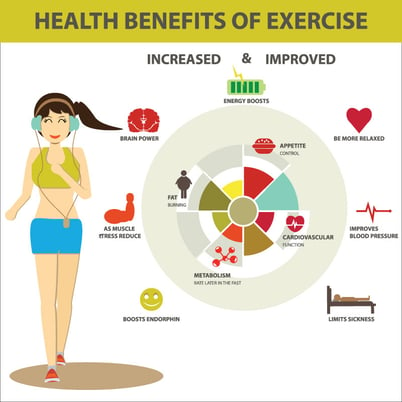In the pursuit of a healthy and fulfilling life, regular exercise emerges as a cornerstone for physical, mental, and emotional well-being. Beyond the pursuit of aesthetic goals, exercise plays a pivotal role in promoting a holistic state of health. This article explores the multifaceted impact of exercise on overall health and highlights the importance of incorporating physical activity into our daily routines.

1. Physical Health Benefits
Exercise is a powerful tool for maintaining and enhancing physical health. Regular physical activity is associated with improved cardiovascular health, strengthened muscles and bones, and enhanced flexibility and balance. It contributes to weight management, reducing the risk of chronic conditions such as heart disease, diabetes, and obesity. Engaging in a variety of exercises, including cardiovascular, strength training, and flexibility exercises, ensures a well-rounded approach to physical health.
2. Mental Well-being
The connection between exercise and mental health is well-established. Physical activity stimulates the release of endorphins, the body’s natural mood lifters, promoting a sense of well-being and reducing symptoms of anxiety and depression. Regular exercise has been linked to improved cognitive function, enhanced memory, and a reduced risk of neurodegenerative diseases. The mental clarity and stress-relief provided by exercise contribute significantly to a positive mindset.
3. Emotional Resilience
Exercise fosters emotional resilience by providing an outlet for stress and pent-up emotions. The rhythmic nature of activities like running or cycling can be meditative, allowing individuals to process and release emotional tension. Moreover, the sense of achievement and self-efficacy gained through regular exercise positively impacts self-esteem and confidence, creating a foundation for emotional well-being.
4. Enhanced Sleep Quality
Quality sleep is crucial for overall health, and exercise plays a key role in promoting restful sleep. Physical activity helps regulate the sleep-wake cycle, improves sleep quality, and reduces the incidence of sleep disorders. Establishing a consistent exercise routine contributes to better sleep patterns, leading to increased energy levels and improved overall functioning during waking hours.
5. Social Connection
Many forms of exercise, such as group classes, team sports, or workout partnerships, provide opportunities for social interaction. Building connections with others who share similar health and fitness goals fosters a sense of community and support. The social aspect of exercise contributes to a positive mindset and emotional well-being.
6. Longevity and Quality of Life
Regular exercise has been linked to increased life expectancy and a higher quality of life in later years. It promotes healthy aging by preserving cognitive function, maintaining mobility, and reducing the risk of chronic diseases. The cumulative impact of a physically active lifestyle extends beyond immediate health benefits, laying the foundation for a more vibrant and active aging process.
Conclusion
Incorporating regular exercise into our lives is a powerful investment in overall health. The multifaceted benefits extend beyond physical fitness, encompassing mental and emotional well-being. Whether through structured workouts, outdoor activities, or recreational sports, finding enjoyable and sustainable forms of exercise is essential. As we recognize the profound impact of exercise on our holistic health, let us embrace it not as a chore but as a lifelong commitment to a healthier, happier, and more fulfilling life. ()





